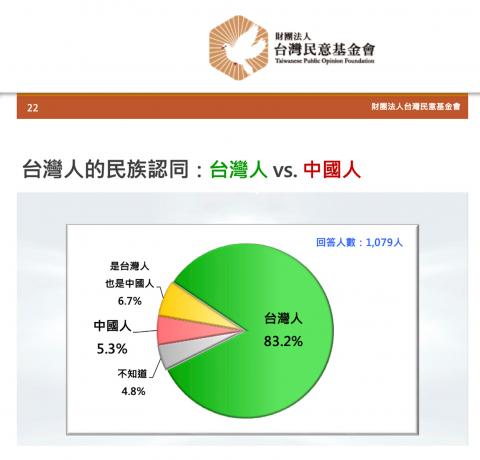Identification as Taiwanese rather than Chinese has surged to 83.2 percent amid the COVID-19 outbreak that began in Wuhan, China, the Taiwanese Public Opinion Foundation said yesterday.
Asked whether they identify themselves as Taiwanese or Chinese, or have other opinions, 83.2 percent of respondents to a poll conducted by Focus Survey Research said Taiwanese, 5.3 percent said Chinese, 6.7 percent said both and 4.8 percent had no opinion or refused to answer.
The results showed that identification as Taiwanese has reached a new high since the foundation’s first such poll in 1991, while identification as Chinese or Chinese and Taiwanese was down by half from a poll in September last year, foundation chairman Michael You (游盈隆) said.

Screen grab from the Wed site of the Taiwanese Public Opinion Foundation
Neither Chinese President Xi Jinping’s (習近平) reiterations of Beijing’s “one country, two systems” formula, nor last year’s protests in Hong Kong led to a significant increase in identification as Taiwanese, which remained at about 70 percent, You said.
There has been an obvious increase since the COVID-19 outbreak, and such change can be seen as significant academically and politically, he added.
Respondents were also asked about the government’s handling of cross-strait issues during the outbreak, with nearly 70 percent voicing approval, and 10.8 percent saying they disapproved, the foundation said.
It is the best rating of the government’s cross-strait policies since President Tsai Ing-wen (蔡英文) took office in May 2016, the foundation said.
Tsai’s overall approval rating was 68.4 percent, compared with 16.5 percent who disapproved, the president’s second-best showing in a foundation poll, while Premier Su Tseng-chang (蘇貞昌) received a 69.4 percent approval rating.
More respondents said they liked the Democratic Progressive Party (41.1 percent), than the Chinese Nationalist Party (KMT) (12.5 percent), the Taiwan People’s Party (9.3), the New Power Party (5.1), the Taiwan Statebuilding Party (1.9) and the People First Party (0.5).
However, 27.2 percent said that they did not favor any party and 0.9 percent said none of the above.
The nationwide poll was conducted on Monday and Tuesday last week and collected 1,079 valid samples. It had a margin of error of 2.98 percentage points.

NATIONAL SECURITY THREAT: An official said that Guan Guan’s comments had gone beyond the threshold of free speech, as she advocated for the destruction of the ROC China-born media influencer Guan Guan’s (關關) residency permit has been revoked for repeatedly posting pro-China content that threatens national security, the National Immigration Agency said yesterday. Guan Guan has said many controversial things in her videos posted to Douyin (抖音), including “the red flag will soon be painted all over Taiwan” and “Taiwan is an inseparable part of China,” while expressing hope for expedited “reunification.” The agency received multiple reports alleging that Guan Guan had advocated for armed reunification last year. After investigating, the agency last month issued a notice requiring her to appear and account for her actions. Guan Guan appeared as required,

A strong cold air mass is expected to arrive tonight, bringing a change in weather and a drop in temperature, the Central Weather Administration (CWA) said. The coldest time would be early on Thursday morning, with temperatures in some areas dipping as low as 8°C, it said. Daytime highs yesterday were 22°C to 24°C in northern and eastern Taiwan, and about 25°C to 28°C in the central and southern regions, it said. However, nighttime lows would dip to about 15°C to 16°C in central and northern Taiwan as well as the northeast, and 17°C to 19°C elsewhere, it said. Tropical Storm Nokaen, currently

PAPERS, PLEASE: The gang exploited the high value of the passports, selling them at inflated prices to Chinese buyers, who would treat them as ‘invisibility cloaks’ The Yilan District Court has handed four members of a syndicate prison terms ranging from one year and two months to two years and two months for their involvement in a scheme to purchase Taiwanese passports and resell them abroad at a massive markup. A Chinese human smuggling syndicate purchased Taiwanese passports through local criminal networks, exploiting the passports’ visa-free travel privileges to turn a profit of more than 20 times the original price, the court said. Such criminal organizations enable people to impersonate Taiwanese when entering and exiting Taiwan and other countries, undermining social order and the credibility of the nation’s

‘SALAMI-SLICING’: Beijing’s ‘gray zone’ tactics around the Pratas Islands have been slowly intensifying, with the PLA testing Taiwan’s responses and limits, an expert said The Ministry of National Defense yesterday condemned an intrusion by a Chinese drone into the airspace of the Pratas Islands (Dongsha Islands, 東沙群島) as a serious disruption of regional peace. The ministry said it detected the Chinese surveillance and reconnaissance drone entering the southwestern parts of Taiwan’s air defense identification zone early yesterday, and it approached the Pratas Islands at 5:41am. The ministry said it immediately notified the garrison stationed in the area to enhance aerial surveillance and alert levels, and the drone was detected in the islands’ territorial airspace at 5:44am, maintaining an altitude outside the effective range of air-defense weaponry. Following